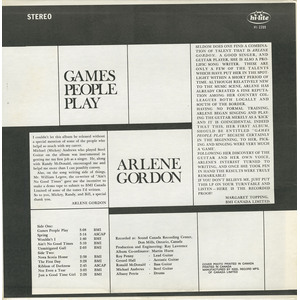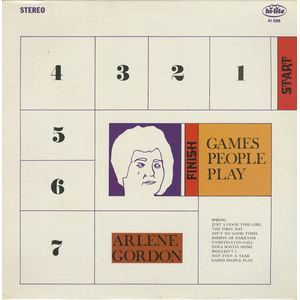Information/Write-up
(born Arlene Joan Mantle, 1940 – September 10, 2012)
Arlene Mantle was a fearless and uncompromising voice in Canadian music — a self-described “poor, beaten, lesbian woman” who transformed her life’s struggles into songs that spoke truth to power. Across four decades, from taverns and union halls to rallies, student protests, and international solidarity tours, she championed the working class, women’s liberation, queer identity, and grassroots resistance. She remains one of Canada’s most vital — if underrecognized — political songwriters.
Born in Toronto in 1940, Mantle made her first recorded appearance under the stage name Arlene Gordon, releasing the LP Games People Play in 1969 on Hi-Lite Records (HI 2209). The album was recorded at Sound Canada Studios in Don Mills, Ontario, and featured session musicians such as Roy Penny, Gerald Hall, and Michael (Mickey) Andrews, the latter of whom helped Arlene land her first job as a singer. Though trained by no formal method, Mantle quickly gained a reputation in the Toronto country scene for her strong voice, honest lyrics, and songwriting talent — much of which was already in evidence on that debut album.
By the early 1980s, Mantle re-emerged under her real name, Arlene Mantle, and became one of the most powerful voices in the intersection of music and activism. She founded the On the Line Music Collective, releasing a string of politically-charged folk albums that included Class Act (1986), In Solidarity (1988), and Full Circle (1994). These recordings — rooted in feminist and labour movements — tackled themes of poverty, justice, sexuality, and resistance. Songs like “Moving Mountains,” “Smash the Right,” and “Our Bodies Are Our Own” became rallying cries at protests and conferences across Canada.
In 1986, Mantle co-wrote the protest anthem The Battle of 66 Street in collaboration with striking meatpacking workers at the Gainers plant in Edmonton, Alberta. Written during a collective songwriting session on July 21, 1986, and released as a 45 rpm single by On the Line in partnership with the United Food and Commercial Workers Union, the track became a frontline anthem for labour rights. The B-side featured a newly adapted version of “Which Side Are You On?” with lyrics by David Durning, further connecting Mantle’s work to the folk protest lineage.
A master of participatory songwriting, Mantle facilitated thousands of workshops with unions and community groups, helping people transform their lived experiences into singable political messages. “She had the knack for inducing people to express the hard times they were having,” recalled anti-violence activist Deb Parent, who dubbed her “the oral history keeper.”
In 1983, she toured post-coup Chile with Bruce Cockburn, and contributed to solidarity compilations like A Time to Stand Together / Le Temps de s’unir (1987). Despite never achieving commercial fame, her music became essential listening for activists and organizers across the country. As Sid Ryan of the Ontario Federation of Labour put it, “She had an incredible talent for working with marginalized people, and women in particular, across the Americas.”
Mantle also stood as a proud and visible lesbian artist. “She was outspoken; she voiced things that many people couldn’t say,” said longtime manager Jayne Walker. Angela Robertson of Blockorama noted that Mantle’s songs “about the reality of working women’s lives” still resonate today.
Though she lived most of her life in poverty — including years at the Bain Co-op in Toronto — Mantle was fiercely generous with her time and music, often performing for free when the cause called. Her daughter Lynn and son Dean both recall being raised around music, community, and constant activism. “She used to drag me along to bars when I was little,” Dean remembers. “I can still hear her voice coming from downstairs.”
Arlene Mantle died on September 10, 2012, at age 72. In May 2013, a tribute concert was held at Trinity-St. Paul’s United Church as part of the Mayworks Festival, featuring artists like Lillian Allen, Faith Nolan, Grupo Taller, and others who had been touched by her voice and vision.
As her family wrote:
“She lit her candle in the wind. She changed our lives with her songs and her courage to sing them. She stood for overcoming personal adversity and standing up to greed.”
-Robert Williston
Arlene Gordon: vocals
Roy Penny: lead guitar
Gerard Hall: acoustic guitar
Mickey Andrews: steel guitar
Ron McDonald: bass
Albany Petrie: drums
Produced and engineered by Ray Lawrence
Recorded at Sound Canada Recording Studio, Don Mills, Ontario
Album coordinator: Martin Hurst
Seldom does one find a combination of talent that is Arlene Gordon. A good singer and guitar player, she is also a prolific songwriter. These are only a few of the talents which have put her in the spotlight within a short period of time. Although relatively new to the music scene, Arlene has already created a fine reputation among her country colleagues both locally and south of the border.
Having no formal training, Arlene began singing and playing the guitar merely as a “kick” — and it is coincidental indeed that this, her first album, should be entitled Games People Play because certainly in the beginning, to her, picking and singing were very much “a game.”
Following her discovery of the guitar and her own voice, Arlene’s interest turned to writing, and once she took pen in hand, the results were truly remarkable!
If you don’t believe me, just put this LP on your turntable and listen — here is the recorded proof!
– Margaret Topping,
BMI Canada Limited
I couldn’t let this album be released without a special mention of some of the people who helped so much with my career. Michael (Mickey) Andrews who played Steel Guitar on the album was instrumental in getting my first job as a singer. He, along with Randy McDonald, encouraged me and helped me more than I can possibly convey. Also, on the song writing side of things, Mr. William Legere, the co-writer of “Ain’t No Good Times” gave me the incentive to make a demo tape to submit to BMI Canada Limited of some of the tunes I’d written.
So to you, Mickey, Randy, and Bill, a special thank you.
-Arlene Gordon



No Comments